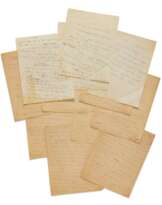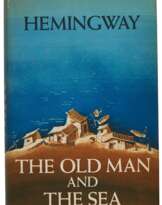ID 1108749
Lot 30 | Hemingway, Ernest | Typed letter signed to Arnold Gingrich, on writing and publishing novels
Estimate value
$ 6 000 – 9 000
Typed letter signed (“Ernest” very hastily in pencil), to Arnold Gingrich, (“Dear Mr. G.”) in Chicago, on writing and publishing novels
3 pages (278 x 215 mm), [Havana], 18 August [1934]; single-spaced in a larger font than usual, on two sheets of poor quality tan paper, a small marginal fold tear, original stamped Ambos Mundos Hotel envelope addressed in Hemingway’s hand.
“The real secret in writing a novel is to keep inside of your action all the time like a horse.”
An exceptional letter, mostly about novel writing, in response to Gingrich’s telling him that he had signed a contract with Alfred A. Knopf to write one. “ ... You can’t write a novel that way. All right, now you write one and show me. But put it — you shouldn’t write a novel that way ... no matter how good a paragraph it would make for your obituary how you ran this mag days and wrote a novel nights. That is not the way to write a novel. Writing a novel is such hard work that it is a full time job. You can’t occupy all your time doing it but you will so poop yourself if you write it well that you’ll need the rest of the day to come back in ... [The Knopfs] turn out nicely printed books and they have a sound jewish flare for Europe and what comes out of same. But they will drop you like a redhot horseshoe if anything ever seems to go wrong or not to go right and they are sharpshooters all the way down the line. There are no wonderful publishers but they are among the least wonderful ... There is no reason for everybody to have written a novel. OK to write it but to write it to a definite publication is an insult to the lousy novel and your own intelligence."
“You mention the Sun etc. I wrote that [The Sun Also Rises] in six weeks (first draft) but I had nothing else to do at the time and was on a vacation with my belly full of what to write and my ear oversensitized by alcohol. But after writing it knew the first draft was lousy so arranged to get another vacation and re-wrote the first part up until they go to Spain down in Schruns in Austria with nothing to bother me. Then went to N.Y. on business [where he switched from Liveright to Scribner’s] and came back to Schruns where nobody could bother me and wrote the Spain part all and completely over. It would have been publishable as written first but it would have been lousy ... About working five hours. What makes it is when you go over the whole piece each day from the start to where you go on from — re-writing it really and then going on. Even then the actual writing is probably only about an hour and a half. Of course lots of times you can’t write but nearly always you do. Each day you throw out what turned out to be shit in the stuff you did the day before."
“But the real secret in writing a novel is to keep inside of your action all the time like a horse. Don’t let the damned horse run away on you when you are going to have to keep racing him forever. And always stop at an interesting place when you still know what is going to happen. Then you can go on from there the next day and the next and etc. Never write yourself out in those bursts. It is just like making a 300 mile race a succession of runaways. Do a certain amount everyday or every two days and always stop where it is interesting and while you are going good.”
Hemingway then, for about two-third of a page, discusses Edwin Balmer, a writer and editor who was very helpful and encouraging to the young Hemingway right after the war. He closes: “How do you think it would be for me to lay off writing for yr. mag for a while? The customers all seem to list me as one of the bad features. Must say the lousy readers can’t hate my stuff as much as hate their stinking little prats so will be perfectly willing to continue punishing them. If I really thought the bulk of them didn’t like the stuff I swear I would give them something to really dislike. Chances are though they are just tossing bricks at the top of the column. Does anybody ever say they like the stuff except me and you?”
| Artist: | Ernest Miller Hemingway (1899 - 1961) |
|---|---|
| Auction house category: | Prints, graphics, books |
| Artist: | Ernest Miller Hemingway (1899 - 1961) |
|---|---|
| Auction house category: | Prints, graphics, books |
| Address of auction |
Sotheby´s 1334 York Avenue 10021 New York USA | ||||||||||||||
|---|---|---|---|---|---|---|---|---|---|---|---|---|---|---|---|
| Preview |
| ||||||||||||||
| Phone | +1 212 606 7000 | ||||||||||||||
| Conditions of purchase | Conditions of purchase | ||||||||||||||
| Business hours | Business hours
|













